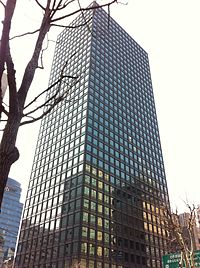South Korean conglomerate
SK Group (Korean: SK그룹, 에스케이그룹) is a South Korean multinational manufacturing and services conglomerate headquartered in Seoul. A chaebol (Korean family-owned conglomerate), SK Group is second largest such conglomerate by revenue in South Korea, after Samsung Group. Through a number of subsidiaries, it is engaged in various businesses, including manufacture of chemicals and petrochemicals, semiconductors, flash memory and miscellaneous information technology, as well providing telecommunications services worldwide among its other less notable ventures.
The conglomerate is composed of 186 subsidiaries and affiliates that share the SK brand name and the group's management culture, named SKMS (SK Management System). It changed its name from Sunkyong Group (Korean: 선경그룹, Hanja: 鮮京그룹) to SK Group in 1998. The group is controlled by estate of Chey Tae-won through a holding company, SK Inc. The cornerstone of SK Group is its energy and chemicals division.[2]
While its largest businesses are primarily involved in the energy, petroleum, and chemical industries, the group also owns the nation's largest wireless mobile phone service provider SK Telecom, and provides services in construction, marketing, local telephone communication s, high-speed internet, and wireless broadband WiBro. Since 2012, SK Hynix, one of the world's largest random access memory and semiconductor manufacturers, has also been majority owned by the group.
History
Formation and early production
As with many other chaebols, SK Group's chairmanship was 'inherited' from father to son: from its founder the late Chey Jong-hyon to its present chairman Chey Tae-won (eldest son). Chey Tae-won is married to the daughter of the former South Korean President Roh Tae-woo.[3]
SK Group began when the current founders acquired Sunkyong Textiles (founded during the Japanese rule as a joint venture between two Japanese companies, Senman Chutan and Kyoto-based Kyoto Orimono Company) from South Korean government as abandoned property of Japan in 1953.[4] In 1958, the company manufactured Korea's first polyester fiber on company grounds. It established Sunkyong Fibers Ltd. in July 1969, and started to produce original yarn. In 1973, SK then established Sunkyong Oil, beginning a vertical integration strategy to manage production, "From Petroleum to Fibers". That same year, the company acquired the Walkerhill Hotel.
In 1976, Sunkyong Corporation received an international trading company license from the Indian government.[5] In December 1980 SK purchased privately run Korea National Oil, making it Korea's fifth largest conglomerate.[6]
In January 1988, crude oil was imported for processing to Korea from Yemen's Marib oil field.[citation needed]
Growing up years
In June 1994, SK entered Korea's telecommunications business by becoming Korea Mobile Telecommunication Service's largest shareholder.[7] In January 1996, SK Telecom launched Korea's first commercial CDMA cellular phone service in Incheon and Bucheon.[8]
In 1998, Management re-branded Sunkyong to SK.[9] In 1999, SK Chemicals developed third-generation (non cross resistant) platinum-complex anti-cancer agent.[10] Also, by focusing its research and development efforts on life sciences, SK Corporation developed YKP1358, a new drug candidate for schizophrenia, in 2003.[11][12]
In 2002, SK Telecom successfully launched the world's first commercial CDMA 1X EV-DO technology, allowing it to offer 3G telecommunications service.[13][14] In 2004, SK Telecom enabled satellite DMB service by deploying the world's first DMB satellite.[15] Moreover, in 2006, SK began revitalizing the 3.5-generation mobile phone market and in the following year, completed the construction of the national HSDPA network. In May 2006, SK Telecom started the world's first commercial 3.5-generation HSDPA service, featuring high-quality video telephony and data transmission, and global roaming access.[16]
In 2005, SK Networks opened China's first two wholly foreign-owned, gas stations in Shenyang. Then, after exploring Brazilian mining area BM-C-8, SK Corporation developed an oil field where it confirmed the existence of more than 50 million barrels of oil deposits.[17]
SK Gas began developing resources overseas when it participated in two mining areas to the west of Russia's Kamchatka peninsula in March 2006. In early 2006, SK Networks also developed Ecol-Green, a biodegradable plastic material. Incheon Oil officially started operations using the SK name in March 2006.[18] SK Energy is currently engaged in 27 oil fields in 15 countries worldwide
SKC imported propylene oxide (PO, a chemical used in manufacturing polyurethane) production technology from Germany in May 2006. It is scheduled to produce 100,000 tons of PO from 2008.[19]
At the end of 2005, SK Corp. developed a lithium ion battery separator (LiBS) for the first time in Korea, and started selling the product in 2006. In July 2007, SK Group adopted a holding company structure.[20][21]
Under the re-organization, SK's main entity, SK Corporation, was split into an investment company, now SK Inc. and an operating company, now SK Energy. The subsidiary companies that now operate under the central SK Inc. umbrella include: SK Energy, SK Telecom, SK Networks, SKC, SK E&S, SK Shipping and K Power.
Recent years
In February 2017, SK acquired the polyethylene acrylic acid business of Dow Chemical Company for $370 million,[22] and planned to increase battery production capacity from 1.9 to 3.9 GWh per year at the end of 2018, supplying Kia and Mercedes.[23]
In July 2022, SK Group announced a $22 billion investment in the United States semiconductor, green energy bioscience and other technology industries. In total, SK Group will invest over $52 billion in the United States by 2025.[24]
Management system
SK's subsidiary companies all operate under the SK Management System (SKMS) which was developed, articulated and enhanced by SK's Chairman, Chey Tae-won.
On April 7, 2008, SK Group launched a marketing and management company named "SK Marketing & Company" to pursue Chairman Chey's vision.



